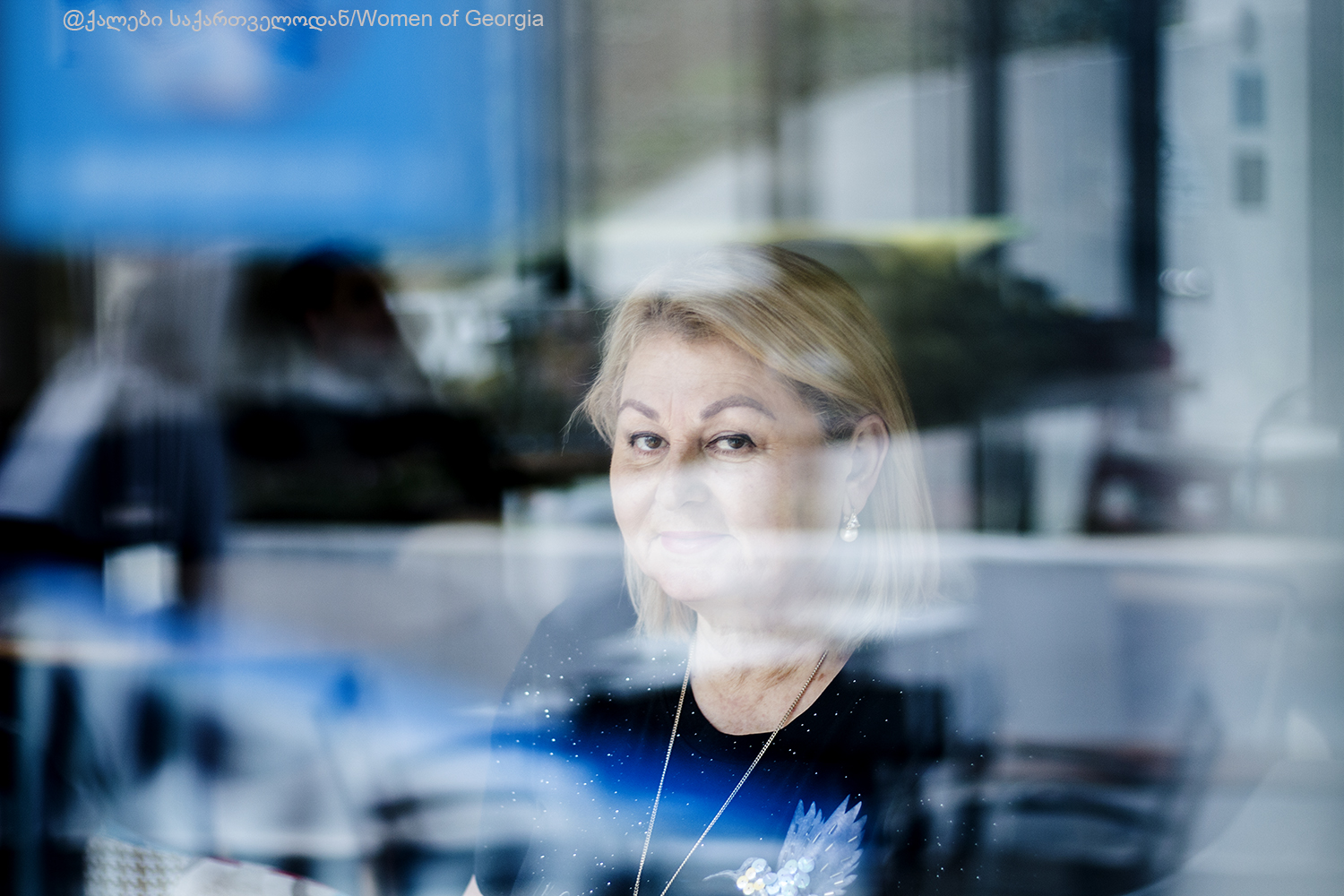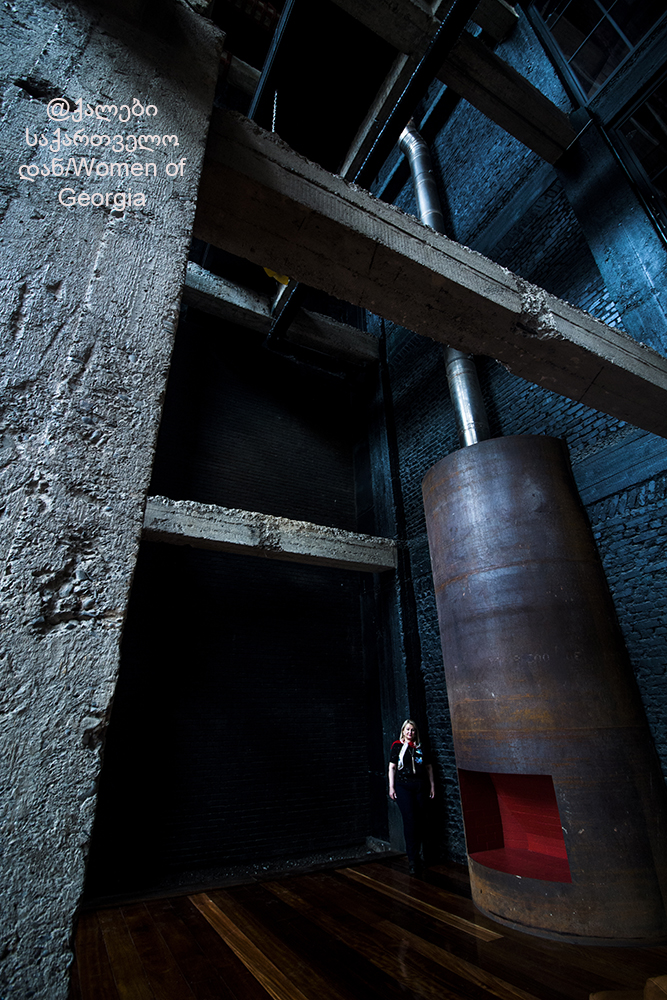Meri Lobzhanidze, 62 years old, Kutaisi
,,If I looked at my life, like it were a movie, two episodes like red lines would stroke my mind, stark and emotional: fireballs launched at our plane escaping Sokhumi, and the doomed scream of a girl mercilessly forced into a car.
I was 18 years old when I left Sokhumi and moved to Kutaisi to study. I loved the technical subjects and decided to become an engineer. My family, especially my father wanted me to wear a white coat, but iodine and cotton wasn’t exactly my thing. Then they advised becoming a teacher — I could be more at home and meanwhile, get a degree. But I had the ambition to take on something more difficult and prove that despite my gender I could master a “male” profession.
I knew there was a multi-profile polytechnic university in Kutaisi. I chose the faculty of light industry, with a minor in Leather Technology and Construction. I met my future husband at the University, we got married and I stayed to live in Kutaisi.
I went through the happiest and the most difficult periods of my life in Abkhazia. Sometimes I think if I had a magic eraser, I would remove those tragic times from my memory. But remembering and rethinking the times of war is paramount for seeing historical mistakes. That’s why we have to talk about it.
On May 9th, 1992 we got a call from Sokhumi that my brother-in-law was wounded at Gumisti bridge and he was flown to Tbilisi by a military plane. My husband and I immediately went to Tbilisi. He lived for 19 days. On May 28th, we flew with the military plane from Tbilisi to Babushera. We buried him in Abkhazia.
 It was almost a month since we left Kutaisi. There was no phone connection. Sokhumi was being bombed intensively. We had to leave Abkhazia immediately to survive. My parents didn’t come with us, first of all, because my brother, brother-in-law, and nephew were fighting and in addition, my father couldn’t imagine leaving his home. Sukhumi will never fall, he was saying and we all actually believed it.
It was almost a month since we left Kutaisi. There was no phone connection. Sokhumi was being bombed intensively. We had to leave Abkhazia immediately to survive. My parents didn’t come with us, first of all, because my brother, brother-in-law, and nephew were fighting and in addition, my father couldn’t imagine leaving his home. Sukhumi will never fall, he was saying and we all actually believed it.
Our family members and relatives, up to 12 people, traveled by foot to Babushera Aerodrome. The road was locked up at Tamishi by enemy forces and maritime routes were dangerous. We walked about 40 kilometers. The small aerodrome of Babushera, like a battled valley, was covered with wounded soldiers, mourning women, children and the elderly.
I don’t even remember how many days and nights we waited for a plane that could take us to the safe place. It wasn’t like they weren’t flying, but only the parliament members would travel with them back and forth, the military wouldn’t let us near the planes, so we didn’t have any other choice but to wait for salvation. I remember the military cars were bringing freshly baked bread and giving to people, or to put it more precisely, they were just dropping off a pile of bread, which the hungry people swarmed.
One evening, it was already getting dark when the soldiers finally noticed us and allowed us, only women and children, on the plane. I don’t remember how I got on the plane. As my husband reminisces, I couldn’t manage myself and some soldiers helped me up the airstair deck. Stress has erased my memories of this scene. I remember the fighters on the stretches, the plane full of standing people, never even dreaming about a seat. It was already dark when the plane took off. When we flew over Tamishi, the sky suddenly flashed and I saw two fireballs flying in our direction. We all held our breath. It was the end, I thought; everybody else probably thought the same. We stayed alive by a miracle. The plane peacefully landed at Tbilisi airport.
Tbilisi seemed like a whole other country. People here were living as usual: On the TV there were ads for Dubai charter flights, entertainment programs and only short news about the ongoing fight in Abkhazia, somewhere far away. People were living their own lives here, not even knowing what’s happening in the country. We had an existential shock. The bus driver wasn’t going to take us to Kutaisi since we didn’t have enough money. We promised him to pay after arrival. When we arrived home, we heard the neighbors’ children shouting – look at them, they’re alive, they survived!
My parents had to leave Sokhumi. My father believed until the last minute that he was only leaving for a couple of days and would be back soon. He left a little piglet in the yard, saved for his long-awaited grandchild’s birthday, and worried he left it without any food; he hurried to return as soon as possible. Sokhumi fell shortly after.
 We were worried about my brother and brother-in-law. We haven’t heard any news from them. I couldn’t look at my mom’s sorrowful eyes and tried to come home late. She looked in my eyes for answers but couldn’t find any. And then, at one sunrise, I heard voices coming from the yard. I went down to check and saw two muddy men – with strange voices, beards, and rifles in the hands. I could hardly recognize my own kin. They survived. We did too. Father couldn’t endure the pain; he died very soon at the age of 69.
We were worried about my brother and brother-in-law. We haven’t heard any news from them. I couldn’t look at my mom’s sorrowful eyes and tried to come home late. She looked in my eyes for answers but couldn’t find any. And then, at one sunrise, I heard voices coming from the yard. I went down to check and saw two muddy men – with strange voices, beards, and rifles in the hands. I could hardly recognize my own kin. They survived. We did too. Father couldn’t endure the pain; he died very soon at the age of 69.
In our home, in Kutaisi, there lived about 16 refugees from Abkhazia. We lived on humanitarian support and coupons: humanitarian beans, rice, milk powder, egg powder, soap. My husband was leaving at 2 AM to bring some bread. When we prepared dinner, the children ate first, then the elderly and if there was anything left for us, we ate only then. If we had any guests, then all that was left for us was roasted chickpea coffee.
I remember one spring. Easter was approaching. It was a rainy day and after work, I was going home, by the foot of course. On my way home I went by a ”commercial” shop and bought some eggs. I was happy to let them wrap 20 eggs in a paper bag – I imagined how we’d have 20 real, red eggs this Easter. I walked happily – my wealth in one hand and an umbrella in another. Suddenly, I heard a car braking and a girl screaming. I saw how two boys in military uniforms ambushed a girl and tried pushing her in the back seat of a car. They tried to close the door, but couldn’t get the girl to cross her legs and were beating her with the door. A second girl managed to run away. I instinctively folded my umbrella, ran to the abusive guy, swearing and hitting him as hard as I could. I saw the eggs falling out of the bag one by one. I realized I couldn’t do anything with hands full, freed my hands and pulled on him. I saw the girl wiggle out of his grip and run away. I imagined if someone forced himself upon my daughter like this. The abuser realized his plans were foiled and I was the only one at his hands. He took his rifle and put the barrel firmly against me. I hoped he would only hit me, not kill me. He cursed me and threatened to kill me. Thank god, the second guy got his head straight, put the other in the car and they fled.
I sat there on the sidewalk; it was raining, but I couldn’t feel anything, my every muscle hurt. I don’t know how long I was sitting on wet asphalt. When I came home, my husband listened closely, his face white in fear. I don’t know who the girl was, but even today I’m happy I was able to save her.
The times were changing fast and an engineering profession became less interesting.
In 2001, I started working in the Public Defender’s Office and in 2002 my friend and partner invited me to work in a newly established NGO.
The Norwegian Refugee Council gave great development opportunities to the Pedagogic Union “Education and The Universe”. We’ve gone through a lot of educational training. It was in 2002 when we first realized the meaning of human rights, informal education systems in the schools, raising the society’s awareness, gender issues and tolerance, feminism and participation, women’s and children’s rights. The participation and engagement of women on all levels. That woman can have their personal space and time for their own interests.
The first training was conducted in conflictology. During the simulation game, we split into groups and I got to play an Abkhazian. I realized that I would have to protect the Abkhazian interests and I found myself empathizing with Abkhazian people and that’s when my aggression and rejection to Abkhazians ended. We’re popularizing peaceful education and fight to restore the trust. Involvement of women and girls in public diplomacy is important.
On all levels of teaching – elementary, secondary and higher education — it’s necessary for the teaching process to be performed democratically, interactively and cognitively.
Children can’t be taught with dictatorial disciplines, but with playing games, cognition and allowing them to express their own opinions.
Today we’re facing new challenges and accomplishment of new ideas. We are planning new projects with the participation of Abkhazian and Osetian partners. We’re promoting peace in education and pursuing the European pro-western teaching methods. Georgia has already made its historical choice and will stay on this course.”

